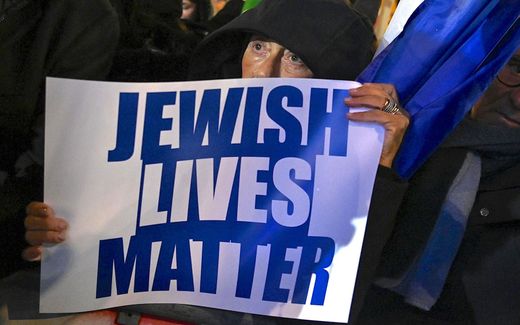How a Palestinian Christian has another perspective on anti-Semitism
17-09-2024
Opinion
Jack Nassar

Orthodox Jews passing a Palestinian in the street. Photo Sjaak Verboom
Opinion
Is it true that anti-Semitism is different from other forms of racism? The Jewish evangelist Avi Snyder said so, in an interview with CNE. But the Palestinian Christian Jack Nassar puts questions along this view.
Receive CNE's weekly newsletter? Feel free to sign up here.
Avi Snyder thinks that unique historical and theological reasons make anti-Semitism different from other forms of racism. His vision is centred on the spiritual calling of the Jewish people as a nation chosen by God. This urges us to consider anti-Semitism through a lens that transcends political discourse.
As a Palestinian Christian, I find it essential to engage with Snyder’s assertions, acknowledging the profound spiritual implications while also bringing forth the realities of our shared human experience.
What is anti-Semitism?
Snyder’s perspective is that anti-Semitism is not merely cultural or racial hatred but a spiritual evil. This calls for a deep reflection on its broader impact. He posits that the Jewish people, chosen by God, are central to His redemptive plan — a role that remains crucial in the unfolding of history.
According to Snyder, this chosenness is not just a historical artefact but a current, living, active component of God’s plan. Because of this, anti-Semitism is a direct assault on this divine mission.
While I acknowledge the spiritual dimension of Snyder’s argument, I also believe that it is crucial to contextualise anti-Semitism in the broader spectrum of human prejudice and suffering. As a Palestinian Christian, my understanding of anti-Semitism is directly connected with the historical and ongoing realities of the Palestinian-Israeli conflict.
However, Snyder’s emphasis on the spiritual nature of anti-Semitism challenges us to look beyond political boundaries and engage with the theological foundations of this hatred.
Chosenness
One of the central themes in Snyder’s argument is the idea of chosenness – a concept rooted in the Abrahamic covenant. For Snyder, this chosenness is not about land or political sovereignty but about a spiritual mission that the Jewish people carry forward. He suggests that the Jewish people are the forerunners of Jesus’s universal call, playing a pivotal role in the fulfilment of God’s promises to humanity.
The notion of chosenness is undeniably complex and multifaceted. Though I don't fully align with Snyder's interpretation of a chosen nation, I acknowledge the profound theological significance this belief holds.
In Christianity, chosenness is not confined to a single group but is extended to all who follow Christ. This universal call does not diminish the unique role that the Jewish people have played in salvation history but rather integrates it into a broader, more inclusive narrative.
However, this broader perspective also invites us to question how the concept of chosenness can be reconciled with the universal message of Jesus – a message that transcends national and ethnic boundaries.
In our shared Christian faith, there is room for different interpretations of how God’s election works. While Snyder’s focus on the Jewish people’s spiritual mission is valid within its theological framework, it must also be understood within the larger context of God’s plan for all of humanity.
Anti-Zionism
Snyder argues that criticism of Israel often crosses into anti-Semitism when it denies the legitimacy of Jewish identity and history. This distinction is indeed crucial, particularly in the context of the Palestinian-Israeli conflict.
However, it is equally important to recognise that legitimate criticism of Israeli government and policies, especially when they result in oppression and suffering, should not be conflated with anti-Semitism.
As a Palestinian, my critique of Israeli policies stems from a desire for justice, peace, and human dignity – values that are deeply rooted in Jesus’s teaching. It is not a rejection of Jewish identity or people but a call for accountability and compassion in a region marred by decades of oppression and occupation.
Snyder’s emphasis on the spiritual chosenness of the Jewish people should not obscure the need for a just and equitable resolution to the Palestinian-Israeli conflict – one that respects the rights, dignity, and humanity of all involved.
In this light, it is essential to foster a dialogue that distinguishes between anti-Semitism and anti-Zionism, ensuring that critiques of Israeli policies and crimes are conducted with an awareness of their broader implications. For Christians, this means supporting discussions that respect both Jewish experiences and Palestinian historical narratives, aiming for a future where justice and peace prevail over division and hatred.
Mutual respect
While much of the focus is on anti-Semitism, it is also necessary to address the anti-Christian sentiments that exist within some Jewish text and communities. Historical and religious animosities, often fuelled by painful memories of persecution, have led to derogatory portrayals of Jesus, Mary, and Christians in certain religious teachings. As Palestinian Christians, we have experienced the double burden of discrimination – first as Palestinians and second as Christians.
These sentiments are not just relics of the past but have real-world consequences, manifesting in attacks on Christian clergy, churches, and properties in the Holy Land. Such actions threaten the diverse religious fabric of the region and undermine the values of tolerance and coexistence that are essential to peace.
It is deeply concerning that these incidents rarely receive the international condemnation they deserve. Western Christians, in particular, must ask themselves whether they are willing to speak out against these injustices and stand in solidarity with their fellow Christians in Palestine.
We must all stand together against all forms of hatred and discrimination – whether anti-Jewish, anti-Islamic, anti-Christian, or any other kind. Our shared faith calls us to be peacemakers, to build bridges rather than walls, and to uphold the dignity of every person, regardless of their faith or background.
Unity and dialogue
Avi Snyder’s vision challenges us to see anti-Semitism as a spiritual battle, one that goes beyond political divisions and touches the very core of our faith. As Christians, we are called to engage in this battle with a spirit of love, understanding, and unity. While our perspectives may differ, especially in contexts as complex as the Middle East, we share a common mission to spread the message of Jesus – a message of hope, redemption, and reconciliation.
Sacred land
In conclusion, while I may approach the issues of anti-Semitism and chosenness from a different angle than Snyder, our dialogue can be a powerful tool for building a world where all people are treated with dignity and respect, where the wounds of the past are healed, and where the love of Christ shines through our words and actions.
Jesus came for all nations. Every land is sacred, every person is valued, and His message is universal. By embracing this universality, we can work together to foster understanding and unity in a world that desperately needs both.
About the author

Jack Nassar is a Palestinian Christian based in Ramallah. He holds a Master of Arts degree in political communications from Goldsmiths University in London and possesses expertise across sectors, driving positive change.
Related Articles











